|
|
||||||||||||||||||||||||||||||||||||||||||||||||
|
CWL’s parents Marriage Certificate |
|||||||||||||||||||||||||||||||||||||||||||||||
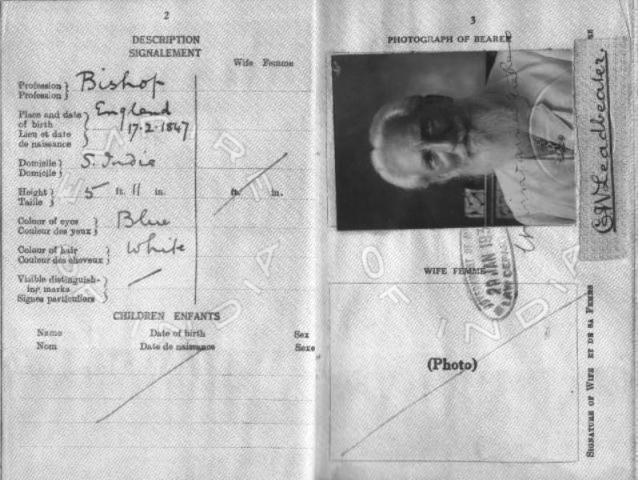 |
|||||||||||||||||||||||||||||||||||||||||||||||
|
CWL passport photo page |
|||||||||||||||||||||||||||||||||||||||||||||||
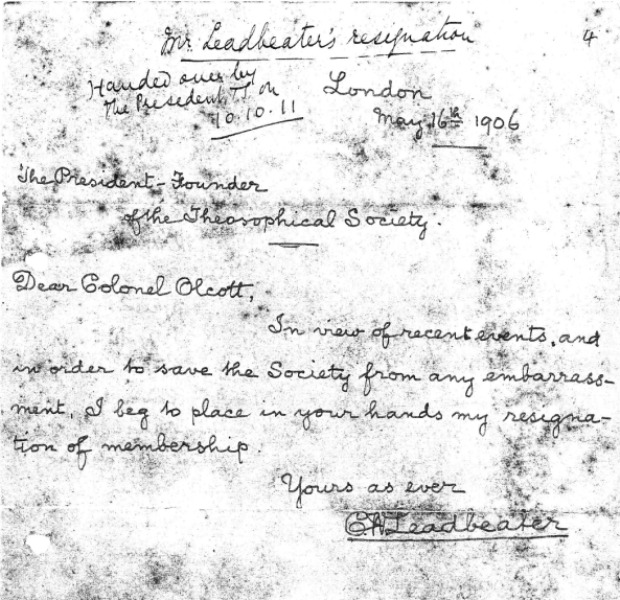 |
|||||||||||||||||||||||||||||||||||||||||||||||
|
CWL’s letter of resignation from the TS |
|||||||||||||||||||||||||||||||||||||||||||||||
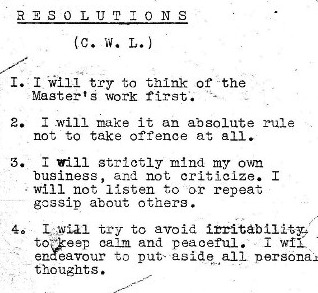 |
|||||||||||||||||||||||||||||||||||||||||||||||
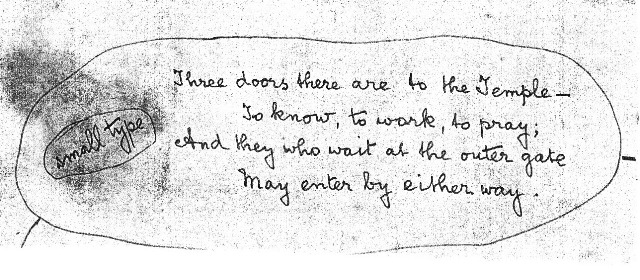 |
|||||||||||||||||||||||||||||||||||||||||||||||
|
CWL’s handwritten note |
|||||||||||||||||||||||||||||||||||||||||||||||
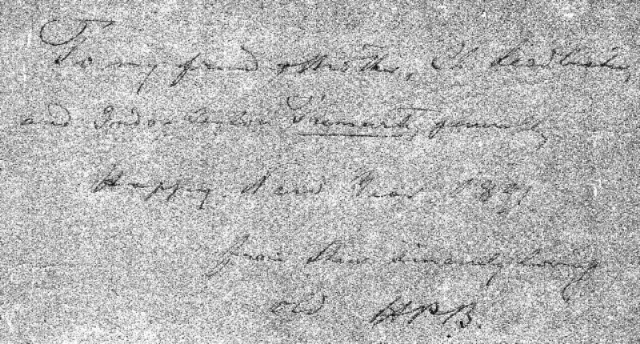 |
|||||||||||||||||||||||||||||||||||||||||||||||
|
HPB’s New Year greetings to CWL. Her message reads: ‘To my friend and brother, Ch. Leadbeater, and Indo-Ceylon Trimurti, generally. Happy New Year 1891 from their sincerely loving, old HPB.’ |
|||||||||||||||||||||||||||||||||||||||||||||||
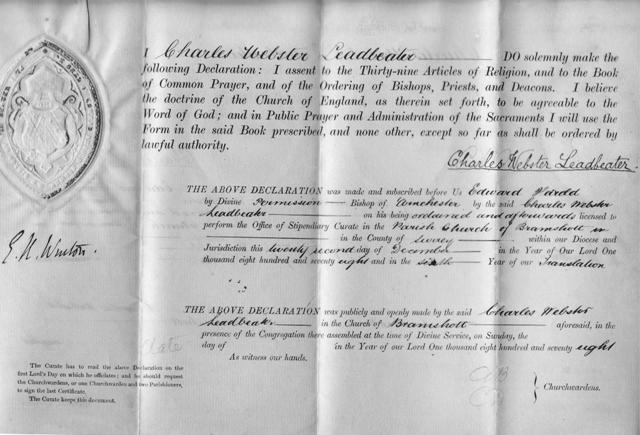 |
|||||||||||||||||||||||||||||||||||||||||||||||
|
CWL’s declaration to the Church of England |
|||||||||||||||||||||||||||||||||||||||||||||||
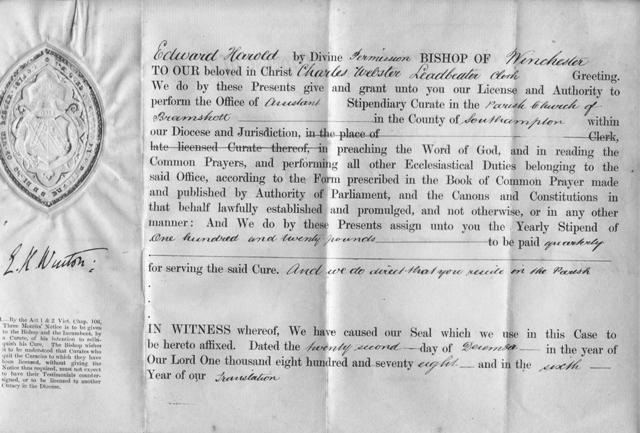 |
|||||||||||||||||||||||||||||||||||||||||||||||
|
CWL’s License as Assistant Stipendiary Curate |
|||||||||||||||||||||||||||||||||||||||||||||||
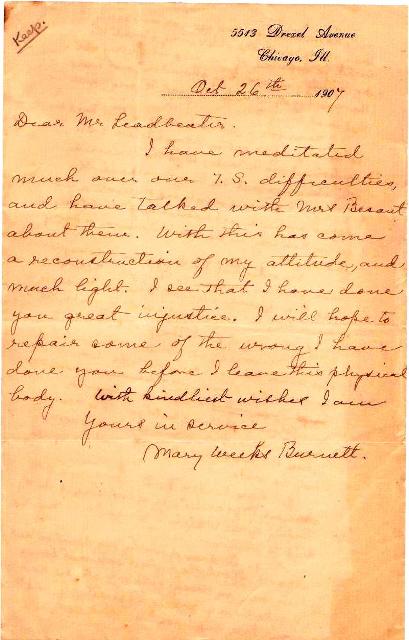 |
|||||||||||||||||||||||||||||||||||||||||||||||
|
Mary Weeks Burnett’s letter of apology to CWL |
|||||||||||||||||||||||||||||||||||||||||||||||
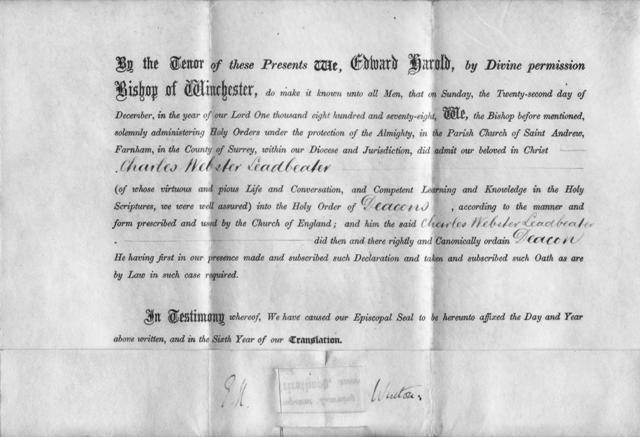 |
|||||||||||||||||||||||||||||||||||||||||||||||
|
CWL’s Certificate of Ordination as a Deacon |
|||||||||||||||||||||||||||||||||||||||||||||||
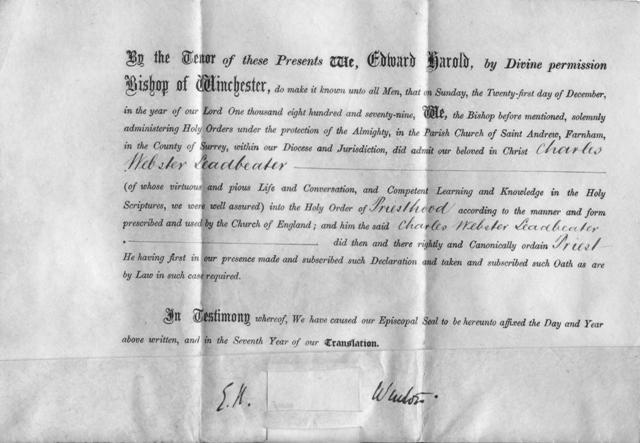 |
|||||||||||||||||||||||||||||||||||||||||||||||
|
CWL’s Certificate of Ordination to Priesthood |
|||||||||||||||||||||||||||||||||||||||||||||||
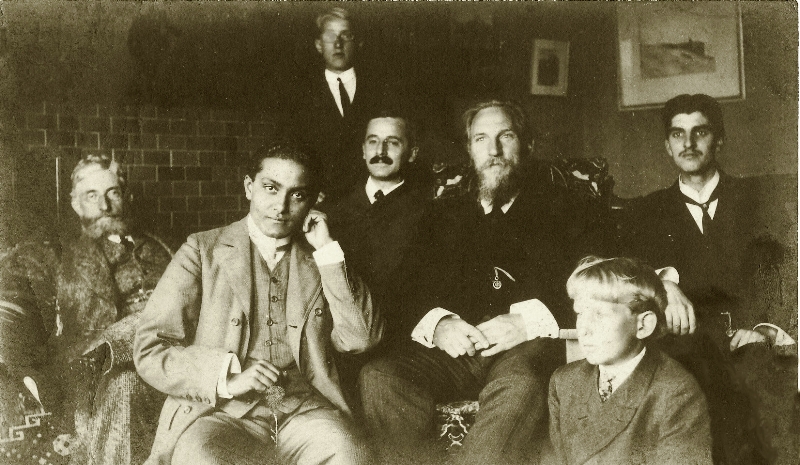 |
|||||||||||||||||||||||||||||||||||||||||||||||
|
Chicago, September 1904: (Left to right) E. W. Dennis, C. Jinarajadasa, Robert Dennis (standing), Frank F. Knothe, C. W. Leadbeater, Donald Dennis (at front) and Basil Hodgson-Smith |
|||||||||||||||||||||||||||||||||||||||||||||||
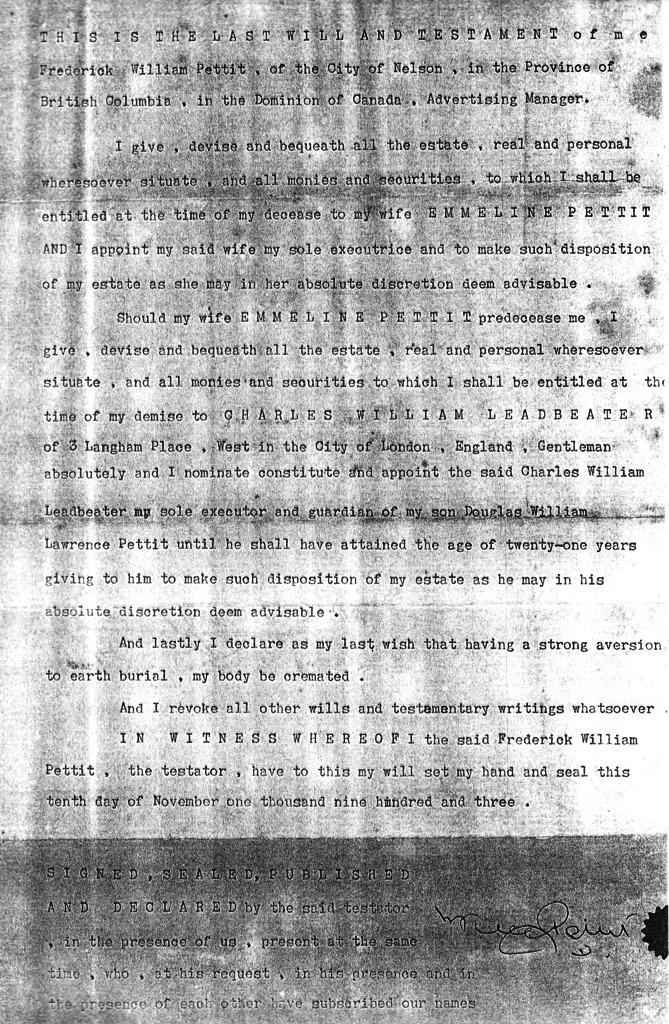 |
|||||||||||||||||||||||||||||||||||||||||||||||
|
Douglas Pettit was one of the boys at the centre of the 1906 accusations against C. W. Leadbeater. Above is the facsimile of the Last Will and Testament of Douglas’ father, Frederick William Pettit, dated 10 November 1903, constituting and appointing CWL as his sole executor and guardian of his son, Douglas William Lawrence Pettit. CWL’s middle name is mentioned as ‘William’ instead of Webster, which is the correct one. |
|||||||||||||||||||||||||||||||||||||||||||||||
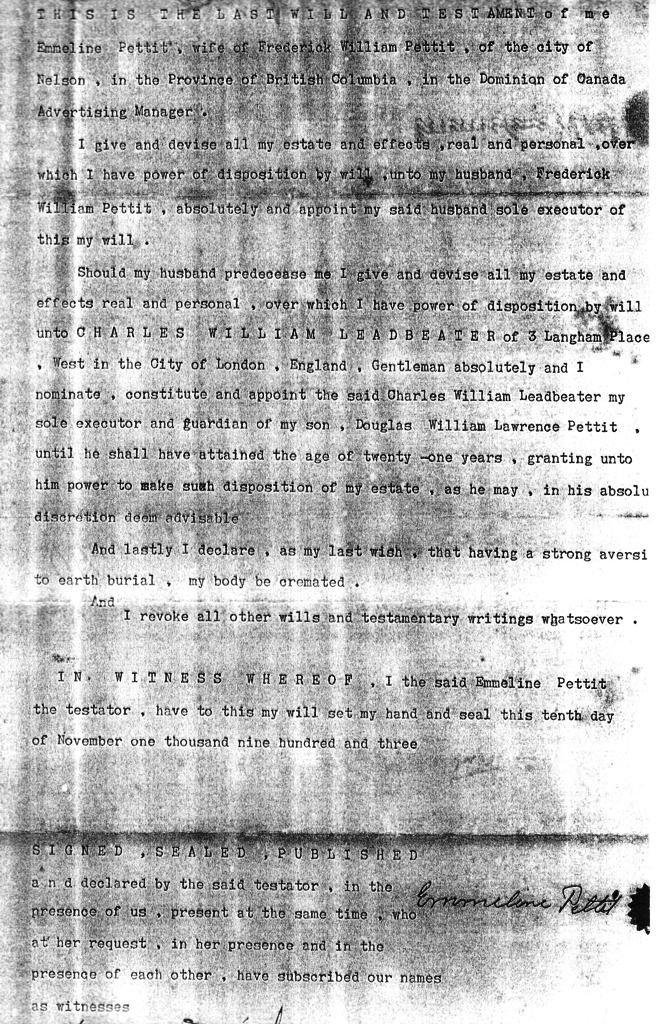 |
|||||||||||||||||||||||||||||||||||||||||||||||
|
Facsimile of the Last Will and Testament of Emmeline Pettit, Douglas Pettit’s mother |
|||||||||||||||||||||||||||||||||||||||||||||||
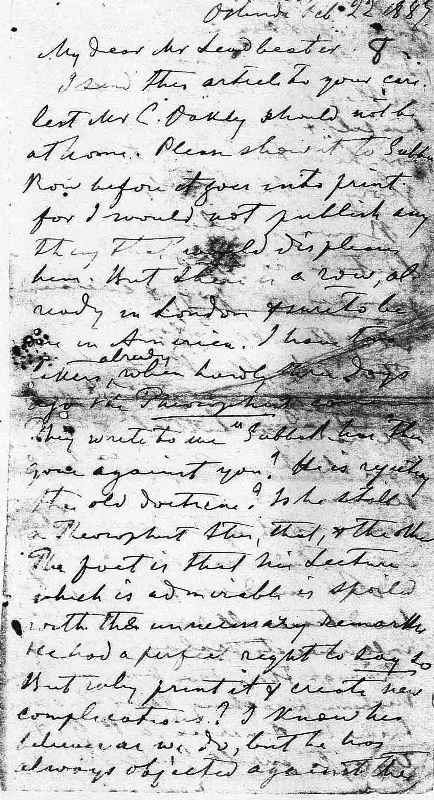 |
|||||||||||||||||||||||||||||||||||||||||||||||
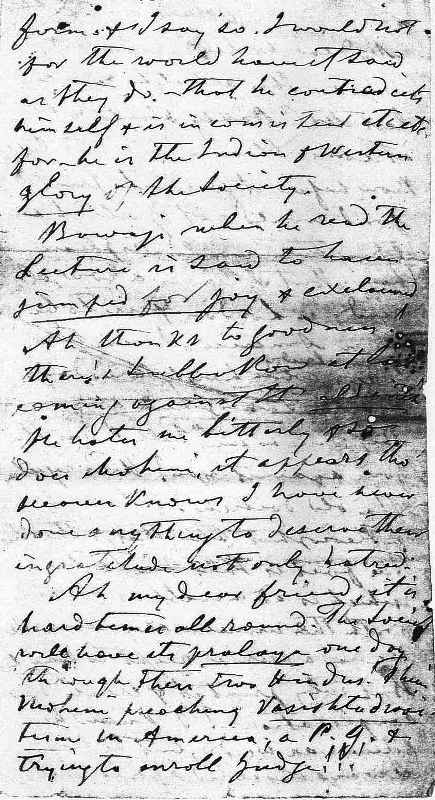 |
|||||||||||||||||||||||||||||||||||||||||||||||
|
Facsimile of H. P. Blavatsky’s letter to CWL, dated 22 February 1887. The name ‘Bowaji’ mentioned in the second part of the letter is sometimes spelled ‘Bawajee’ and refers to a probationary chela sent to Europe to help HPB in her work. He later on turned against her and the TS. The initials ‘P.G.’ at the end of the letter may indicate the expression ‘Personal God’ as the Vishishtadvaita school admits that notion. The transcription of the letter is given below. |
|
Ostende Feb 22 1887 My dear Mr Leadbeater I send this article to your care lest Mr C. Oakley should not be at home. Please show it to Subba Row before it goes into print. I would not publish any thing that would displease him. But there is a row, already in London and sure to be one in America. I have two letters already, when hardly three days ago the Theosophist came in. They write to me “Subba R. has then gone against you? He is rejecting the old doctrine? Is he still a Theosophist this, that, and the other. The fact is that his Lecture which is admirable is spoiled with these unnecessary remarks. He had a perfect right to say so. But why print it and create new complications? I know he believes as we do, but he has always objected against the form and I say so. I would not for the world have it said as they do that he contradicts himself and is inconsistent etc etc. for he is the Indian and Western glory of the Society. Bowaji when he read the Lecture is said to have jumped for joy and exclaimed Ah thanks to goodness! There’s Subba Row at last coming against the [undecipherable words] He hates me bitterly and so does Mohini, it appears tho heaven knows I have never done anything to deserve their ingratitude not only hatred. Ah my dear friend, it is hard times all round. The Society will have its pralaya one day through these two Hindus. I hear Mohini preaching Visishtadwaitism in America; a P. G. and trying to enroll Judge!!!
|
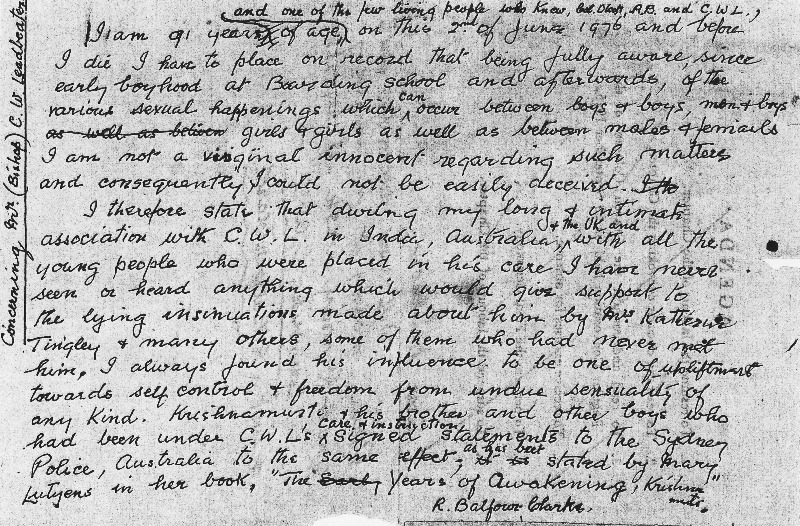 |
|
Dick Clarke’s written testimony about C. W. Leadbeater |
|
As is widely known, Dick Balfour-Clarke was closely associated with C. W. Leadbeater from 1909 until his passing in 1934. Before he passed away at Adyar in 1980, Balfour-Clarke wanted to leave his own written testimony about CWL’s integrity in view of the ongoing accusations against him. We include below the transcription of his statement, the facsimile of which is reproduced above. Concerning Mr (Bishop) C. W. Leadbeater I am 91 years of age, and one of the few living people who knew Col. Olcott, A.B. and C.W.L., on this 2nd of June 1976 and before I die I have to place on record that being fully aware, since early boyhood at Boarding School and afterwards, of the various sexual happenings which can occur between boys and boys, men and boys, girls and girls as well as between males and femails [sic] I am not a virginal innocent regarding such matters and consequently I could not be easily deceived. I therefore state that during my long and intimate association with C.W.L. in India, Australia and the UK and with all the young people who were placed in his care I have never seen or heard anything which would give support to the lying insinuations made about him by Mrs Katherin [sic] Tingley and many others, some of them who had never met him. I always found his influence to be one of upliftment towards self-control and freedom from undue sensuality of any kind. Krishnamurti and his brother and other boys who had been under C.W.L.’s care and instruction signed statements to the Sydney Police, Australia to the same effect, as has been stated by Mary Lutyens in her book “The Years of Awakening, Krishnamurti”. R. Balfour-Clarke
|
|
CWL’s letter from ‘exile’ to Fritz Kunz |
|||
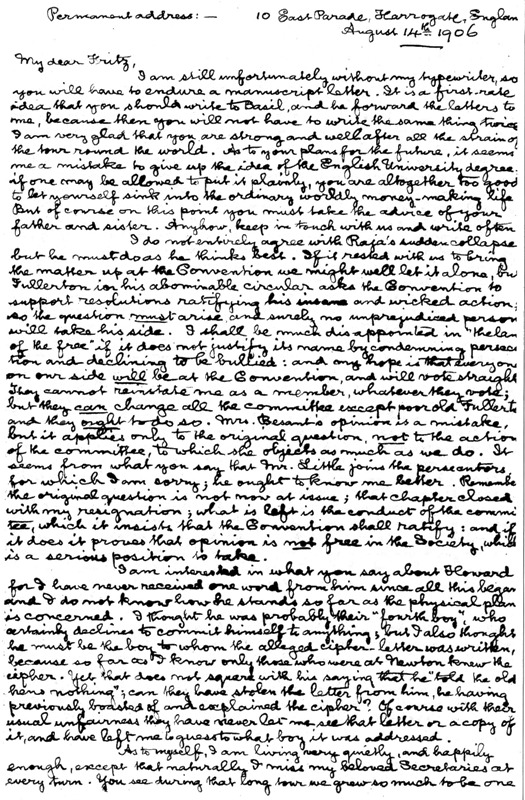 |
|||
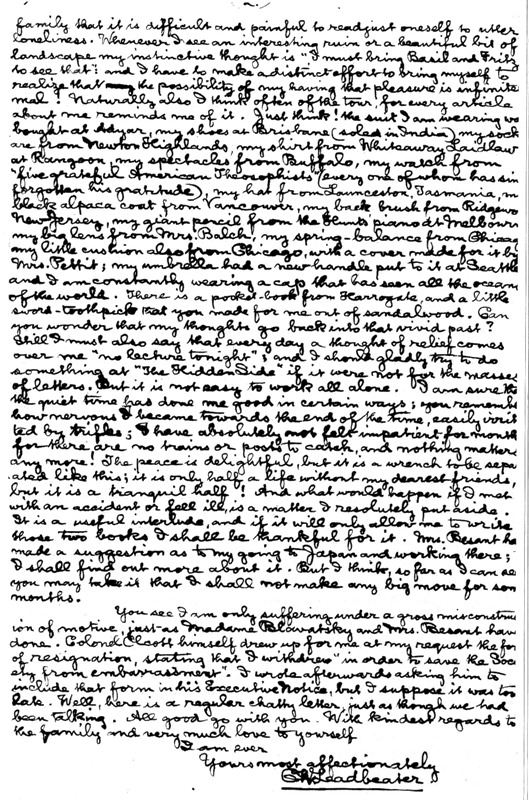 |
|
|
||||||||||||||||||||||||||||
|
Fritz Kunz and his family were associated with C. W. Leadbeater since the early 1900s. He travelled extensively with him and had a close understanding of the events that led to his resignation from the TS in 1906. In the following letter to Kunz, CWL touches upon some of the underlying issues of that crisis. Fritz Kunz had the intention of writing a biography of CWL and communicated that intention to John Coats, who would later become the President of the TS. That project, however, never materialized. CWL’s letter, whose transcription is posted below, is unique in many ways. It shows how busy he was in ‘exile’, writing books and answering a massive correspondence. But it also shows his reverie while referring to his world wide lecture tour for the TS some years earlier and how he missed his dear friends.
Permanent address: − 10 East Parade, Harrogate, England August 14th 1906 My dear Fritz, I am still unfortunately without my typewriter so you will have to endure a manuscript letter. It is a first rate idea that you should write to Basil, and he forward the letters to me, because then you will not have to write the same thing twice. I am very glad that you are strong and well after all the strain of the tour around the world. As to your plans for the future, it seems to me a mistake to give up the idea of the English University degree; if one may be allowed to put it plainly, you are altogether too good to let yourself sink into the ordinary worldly money-making life. But of course on this point you must take the advice of your father and sister. Anyhow, keep in touch with us and write often. I do not entirely agree with Raja’s [C. Jinarājadāsa] sudden collapse but he must do as he thinks best. If it rested with us to bring the matter up at the Convention we might well let it alone, but Fullerton in his abominable circular asks the Convention to support resolutions ratifying his insane and wicked action; so the question must arise and surely no unprejudiced person will take his side. I shall be much disappointed in “the land of the free” if it does not justify its name by condemning persecution and declining to be bullied: and my hope is that every one on our side will be at the Convention, and will vote straight. They cannot reinstate me as a member, whatever they vote; but they can change all the committee except poor old Fullerton and they ought to do so. Mrs. Besant’s opinion is a mistake, but it applies only to the original question, not to the action of the committee, to which she objects as much as we do. It seems from what you say that Mr. Little joins the persecutors for which I am sorry; he ought to know me better. Remember: the original question is not now at issue; that chapter closed with my resignation; what is left is the conduct of the committee, which it insists that the Convention shall ratify: and if it does it proves that opinion is not free in the Society, which is a serious position to take. I am interested in what you say about Howard [Maguire] for I have never received one word from him since all this began and I do not know how he stands so far as the physical plane is concerned. I thought he was probably their “fourth boy”, who certainly declines to commit himself to anything; but I also thought he must be the boy to whom the alleged cipher letter was written, because so far as I know only those who were at Newton knew the cipher. Yet that does not square with his saying that he “told the old hens nothing”; can they have stolen the letter from him, he having previously boasted of and explained the cipher? Of course with their usual unfairness they have never let me see that letter or a copy of it, and have left me to guess to what boy it was addressed. As to myself, I am living very quietly, and happily enough, except that naturally I miss my beloved Secretaries at every turn. You see during that long tour we grew so much to be one family that it is difficult and painful to readjust oneself to utter loneliness. Whenever I see an interesting ruin or a beautiful bit of landscape my instinctive thought is “I must bring Basil and Fritz to see that”: and I have to make a distinct effort to bring myself to realize that the possibility of my having that pleasure is infinitesimal! Naturally also I think often of the tour for every article about me reminds me of it. Just think! The suit I am wearing we bought at Adyar, my shoes at Brisbane (soled in India) my socks are from Newton Highlands, my shirt from Whiteaway Laidlaw at Rangoon, my spectacles from Buffalo, my watch from “five grateful American Theosophists” (everyone of whom has since forgotten his gratitude), my hat from Launceston, Tasmania, my black alpaca coat from Vancouver, my back brush from Ridgewood, New Jersey, my giant pencil from the Hunts piano at Melbourne, my big lens from Mrs. Balch, my spring-balance from Chicago, my little cushion also from Chicago, with a cover made for it by Mrs. Pettit; my umbrella had a new handle put to it at Seattle and I am constantly wearing a cap that has seen all the oceans of the world. There is a pocket-book from Harrogate, and a little sword-toothpick that you made for me out of sandalwood. Can you wonder that my thoughts go back into that vivid past? Still I must also say that every day a thought of relief comes over me “no lecture tonight”; and I should gladly try to do something at “The Hidden Side” [The Hidden Side of Things] if it were not for the masses of letters. But it is not easy to work all alone. I am sure the quiet time has done me good in certain ways; you remember how nervous I became towards the end of the time, easily irritated by trifles; I have absolutely not felt impatient for months for there are no trains or post to catch, and nothing matters anymore! The peace is delightful, but it is a wrench to be separated like this; it is only half a life without my dearest friends, but it is a tranquil half! And what would happen if I met with an accident or fell ill, is a matter I resolutely put aside. It is a useful interlude, and if will only allow me to write those two books [The Hidden Side of Things and The Inner Life] I shall be thankful for it. Mrs. Besant has made a suggestion as to my going to Japan and working there; I shall find out more about it. But I think, so far as I can see, you may take it that I shall not make any big move for some months. You see I am only suffering under a gross misconstruction of motive, just as Madame Blavatsky and Mrs. Besant have done. Colonel Olcott himself drew up for me at my request the form of resignation, stating that I withdrew “in order to save the Society from embarrassment”. I wrote afterwards asking him to include that form in his Executive Notice, but I suppose it was too late. Well, here is a regular chatty letter, just as though we had been talking. All good go with you. With kindest regards to the family and very much love to yourself I am ever Yours most affectionately C. W. Leadbeater
|
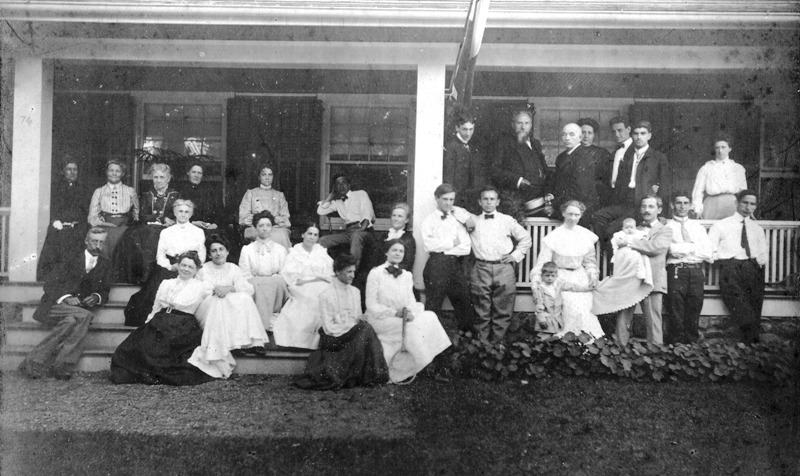 |
|
New Jersey, USA, 1904. CWL with a group of American members, including Alexander Fullerton, General Secretary of the TS in America at that time, Kate B. Davis, Henry Hotchener, Basil Hodgson-Smith (from England) , Mrs Knothe, Aleck Knothe and Frank R. Knothe (with Helen in his arms; she would later be one of the pupils of CWL at The Manor in Sydney.) |
|||
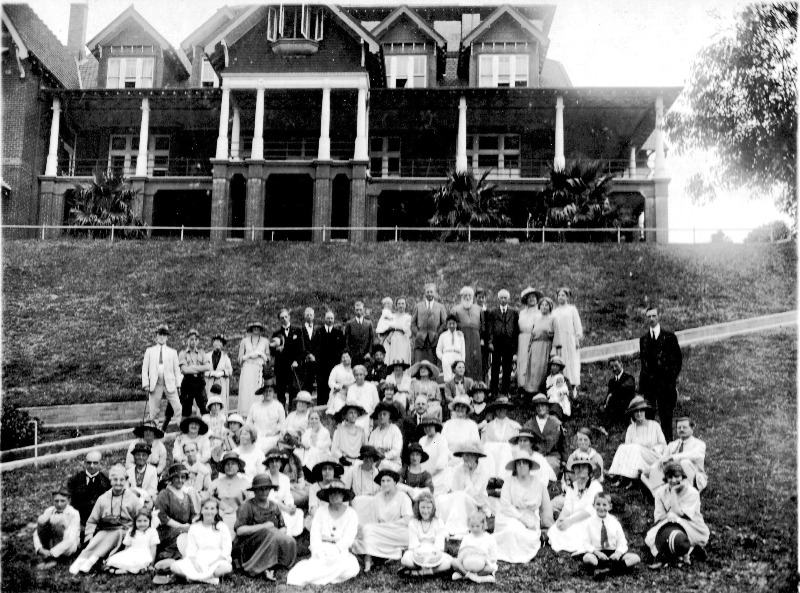 |
|||
|
Monthly members’ meeting of the Order of the Star in the East and friends, held at The Manor, Mosman, Sydney, February 1923. |
|
|
|
|||||||||||||||||||||||||||||||||||||||||||||||||||||||||||||||||||||||||||||||||||||||||||||||||||||||||||||||||||||||||||||||||||||||||||||||||||||||||||||||||||||||||||||||||||||||||||||||||||||||||||||||||||||||||||||||||||||||||||||||||||||||||||||||||||||||||||||||||||||||||||||||||||||||||||||||||||||||||||||||||||||||||||||||||||||||||||||||||||||||||||||||||||||||||||||||||||